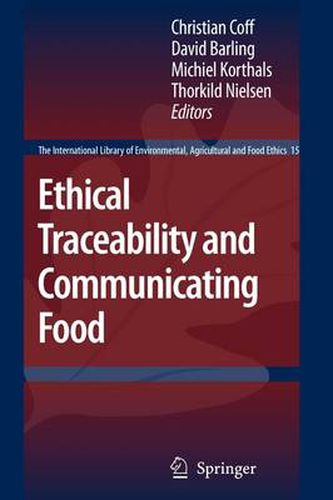Readings Newsletter
Become a Readings Member to make your shopping experience even easier.
Sign in or sign up for free!
You’re not far away from qualifying for FREE standard shipping within Australia
You’ve qualified for FREE standard shipping within Australia
The cart is loading…






This title is printed to order. This book may have been self-published. If so, we cannot guarantee the quality of the content. In the main most books will have gone through the editing process however some may not. We therefore suggest that you be aware of this before ordering this book. If in doubt check either the author or publisher’s details as we are unable to accept any returns unless they are faulty. Please contact us if you have any questions.
The theme of this book evolved from the idea of linking three concepts around food: traceability, ethics and informed choice. We believe that the current devel- ment and implementation of traceability in the agri-food sector offers an interesting way not only of handling food safety but also of addressing and communicating ethical issues arising from current food production practices. Practices in the agri-food sector worry food consumers (as we all are, since we need to eat and drink to stay alive). But how can consumers act upon their concerns? Paradoxically, although consumers are bombarded with information on food - from the media, the food industry, food authorities, NGOs and interest groups - details about how foods are actually produced is often hard to find. Much of the infor- tion available is superficial, conflicting or partial, and it is hard for consumers seeking to mak e informed food choices to know which information to trust. The consumers we interviewed for this project felt that information about food products was withheld and manipulated. Traceability, which provides a record of the history and journey of a given food, and which is increasingly used in the food sector for legal and commercial reasons, has the potential to communicate a more authentic picture of how food is produced.
$9.00 standard shipping within Australia
FREE standard shipping within Australia for orders over $100.00
Express & International shipping calculated at checkout
This title is printed to order. This book may have been self-published. If so, we cannot guarantee the quality of the content. In the main most books will have gone through the editing process however some may not. We therefore suggest that you be aware of this before ordering this book. If in doubt check either the author or publisher’s details as we are unable to accept any returns unless they are faulty. Please contact us if you have any questions.
The theme of this book evolved from the idea of linking three concepts around food: traceability, ethics and informed choice. We believe that the current devel- ment and implementation of traceability in the agri-food sector offers an interesting way not only of handling food safety but also of addressing and communicating ethical issues arising from current food production practices. Practices in the agri-food sector worry food consumers (as we all are, since we need to eat and drink to stay alive). But how can consumers act upon their concerns? Paradoxically, although consumers are bombarded with information on food - from the media, the food industry, food authorities, NGOs and interest groups - details about how foods are actually produced is often hard to find. Much of the infor- tion available is superficial, conflicting or partial, and it is hard for consumers seeking to mak e informed food choices to know which information to trust. The consumers we interviewed for this project felt that information about food products was withheld and manipulated. Traceability, which provides a record of the history and journey of a given food, and which is increasingly used in the food sector for legal and commercial reasons, has the potential to communicate a more authentic picture of how food is produced.